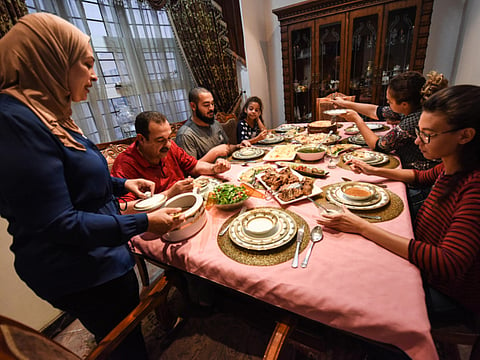Ramadan nurtures goodness of heart and mind
For Al Naggar family from Egypt, Ramadan is a time to share love, better one’s self and spread harmony

Dubai: As iftar approaches, sisters Nariman and Farida set the table and their mother begins to heat up the food and prepare the Molokhiya, an Egyptian dish made from jute leaves.
At the Al Warqaa home of Hendy Rady and her husband Khaled Al Naggar, the atmosphere is brimming with familial joy and harmony. The Egyptian couple have five children, Mamdouh, their 20-year-old son, and daughters Nariman, 20, Farida, 17, Alia, 8, and Farah, 6.
Rady is a stay-at-home mom and El Naggar, a mechanical engineer.
Home-made appetisers comprising dates soaked in milk, dried fruits, and a Ramadan iftar essential, soup. are brought to the table.
Reflecting on their time spent in Egypt, Rady talks of the unforgettable spirit of Ramadan that pervaded the air. “[An] unmistakable aroma filled the streets of Tanta, from fruits and desserts to the local food,” Rady recalled.
“Not only were the houses and streets decorated, there was also a town-crier who carried a small drum-like instrument announcing the crack of dawn and time for suhour,” Rady recalled.
Ramadan was a magical month that brought people together, she said. “Children would run around and play with each other in the streets,” Rady added.
“The booming sound of a shaikh reciting the Quran from a nearby mosque echoed throughout our home and filled our senses with joy. It is a regular practice in Muslim households in Egypt to read and listen Quran recitation on a daily basis during Ramadan,” Rady said.
From a young age, it was instilled in all of them that reading the Quran and praying is very important. “Ramadan helps you stay consistent with your prayers and in return, that gives you a deeper connection to God,” said Rady.
She believes that Ramadan is a month that nurtures goodness. “Not only does everyone establish a closer relationship with God during this holy month, it also contributes to one’s personal improvement and spirituality.”
From sharing meals to prayers, there is a harmony between all the customs associated with Ramadan and the daily fast, Rady said. Fasting, she said, brings people together in a spiritual effort to cleanse one’s soul and better one’s self.
“What’s rewarding is that it’s never just a one-month endeavour; it’s a personal revelation which lasts a lifetime,” Rady added.
“Ramadan is a time of appreciation — of food, water, and family,” added Nariman.
For Khaled, Ramadan means family. “We see and visit each other much more often [during Ramadan],” he said. “ [It] brings us together.”
With individual schedules dominating people’s lives, Farida believes Ramadan offers the opportunity to come together as a family. “It’s heart-warming to be able to sit alongside my siblings and parents every day and hold a proper conversation because we are always doing our own thing and we never get the chance to spend time together and count our blessings,” said Farida.
Rady said that she looks forward during Ramadan to see all her children gather at the dining table every day. “During other days, everyone is busy working on different things, so we lose that sense of harmony,” she added.
At iftar, the long dining table was laden with dishes, all reflecting the rich Egyptian culture. Rady elegantly poured the classic Ramadan soup, shurbat lisan asfour (bird’s tongue), into the golden bowls to end their fast.
“Every dish includes a healthy component. The Molokhiya is a healthy vegetable in itself — we just mince it. The beef ribs are great source of protein,” said Rady.
There was Gollash, a savoury pastry filled with vegetables that’s crispy and crunchy to relish.
Rady’s youngest daughters share what they enjoy doing most during Ramadan. “I like to practise fasting, I fast half the day and I cannot wait until I am 10 years old to start fasting properly,” said Alia.
Her younger sister Farah said that she “loves decorating the house for Ramadan” along with her mother.
— (Aya Sadek is an intern at Gulf News).
Recipe of the day
Molokhiya (Jute leaves)
(Serves 7-8)
Ingredients
1kg fresh molokhiya leaves
2 cups chicken or meat stock
4-5 garlic cloves (crushed)
1 tsp coriander powder
Salt and pepper (as required)
Method:
■ Pluck the molokhiya leaves from the stems, and wash them thoroughly to remove the grit. Using a mezzaluna or chef’s knife, mince the leaves until they become paste-like. You can also make the paste in a food processor.
■ Heat the stock in a pot till it comes to a boil. Pour the molokhiya paste into the stock, turn down the flame and let it simmer for 5 minutes.
■ Turn off the heat.
■ In a separate pan, heat butter and toss in the crushed garlic and stir until garlic is golden. Add the coriander powder and stir through. Pour the mixture into the molokhiya soup and stir thoroughly.
■ Serve hot.
Sign up for the Daily Briefing
Get the latest news and updates straight to your inbox



